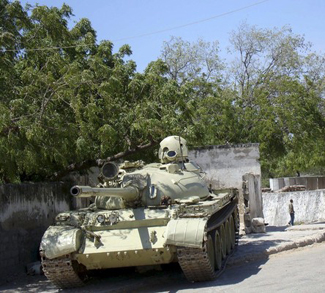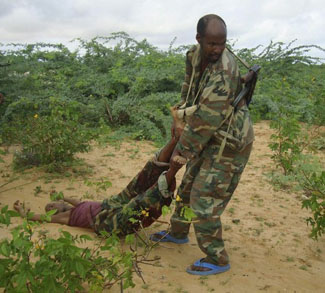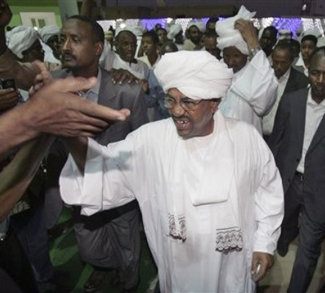FORECAST
This weekend’s double bombing in Kampala bears all the hallmarks of an al-Shabab attack. It seems that Somalia’s homegrown strain of the Taliban has struck outside its own borders for the very first time.
Evidence pointing to an al-Shabab hand in the Kampala attacks is growing stronger and stronger. Unconfirmed reports from the scene of the blasts have noted the presence of a severed head and the remains of two victims thought to be suicide bombers of Somali origin. While it may take a while to uncover a ‘smoking gun’ through forensics, al-Shabab definitely has a motive for these kinds of attacks and the militant group has threatened to strike within Uganda before. Uganda is a key member of the African Union AMISOM deployment in Mogadishu, and just last week it pledged to boost its troop commitment. Also, the targeting of an Ethiopian restaurant harkens to old al-Shabab vendettas concerning Ethiopian involvement in the 2006 ouster of the Islamic Courts Union government in Mogadishu.
Although this is the first instance of an al-Shabab attack outside Somali borders, the writing has been on the wall for a long time that al-Shabab would eventually attempt to export violence and fundamentalist ideology to surrounding countries. In the wake of the abortive Christmas Day bombing, al-Shabab made clear its willingness to join up with Al Qaeda in the Arabian Peninsula and transpose the conflict in lawless Somalia onto the wider region.
The situation presents somewhat of a ‘catch-22’ for Ugandan authorities. If they respond to the attacks by pushing harder in Somalia and possibly even ‘taking the fight to al-Shabab,’ then the conflict could take on a new intensity. Such an expansion of the size and scope of the AMISOM mission would play into al-Shabab plans insofar that the conflict for Mogadishu could be recast in a nationalist mould with al-Shabab donning the cloak of Somali nationalism in the fight against encroaching Western-backed interests.
As al-Shabab strengthens its hold on southern Somalia and the transitional government in Mogadishu appears less and less likely to ever mount a serious campaign to recover lost ground, all eyes are starting to land on Somaliland; a pseudo-independent and relatively stable territory in northern Somalia. It is looking increasingly likely that it’s merely a matter of time before the transitional government in Mogadishu falls to al-Shabab militants. If this happens, al-Shabab will then bring the struggle towards Somaliland in an effort to establish control over a united Somalia.
At this point, American and African Union support could hypothetically shift to Hargeisa, the capital of Somaliland. If Mogadishu falls, AMISOM stakeholders will be searching for a way to carry on the fight against al-Shabab militancy and stabilize Somalia. On the other side, the government of Somaliland has long sought international recognition as a functioning independent state. There may not even be much choice in the matter, as the militant group has made it clear that it considers Somaliland a part of a united Somalia and that it would fight for it if the need arose.
Al-Shabab efforts to export violent ideology and stage attacks outside Somalia’s borders are particularly troubling due to the fact that the international community’s hands are tied when it comes to staging a response. An ANISOM escalation risks igniting nationalist passions and consequently further imperils security. Similarly, even if the United States was willing to put troops on the ground, the same dynamic would exist. In sum, most military approaches to the problem simply risk intensifying the conflict and dragging it out over a longer period of time.
The situation is somewhat similar to Afghanistan insofar that negotiation between the government and militants seems to be the only real way to defuse the conflict. What remains to be seen is whether or not Somalia will take as long as Afghanistan has to arrive at the same conclusion.
SUMMARY OF EVENTS: July 5th – July 12th, 2010
NORTH AMERICA
United States
The National Security Agency has begun work on an “expansive” spy system that will monitor critical infrastructure inside the United States for cyber-attacks, in a move that detractors say could end up violating privacy rights and expanding the NSA’s domestic spying abilities.
Despite its role in the Gulf of Mexico oil spill, energy giant BP remains a key supplier of fuel to the Pentagon, The Washington Post reported.
Mexico
With Mexico’s left divided and Calderon sinking in opinion polls, the PRI is eyeing a return to national power in 2012, two terms after PAN ended its 71-year rule in 2000.
WESTERN EUROPE
Europe
Euro MPs have approved a new deal to allow US anti-terror investigators to access Europeans’ bank data.
Norway
Three people have been arrested in connection with a plot to bomb targets in Norway, police in Oslo have said.
France
Prosecutors have launched an investigation into claims of illegal campaign funding for French President Nicolas Sarkozy, officials say.
A French bill to ban full-face veils worn by some Muslim women in public will go to parliament on Tuesday, bringing closer a measure which critics argue is hard to enforce and may be unconstitutional.
EASTERN EUROPE
Russia
The US and Russia have taken part in the biggest spy swap since the Cold War, in an exchange at Vienna airport.
Reports from Russia say a prisoner swap is being planned to bring 10 suspected Russian spies back from the US.
MIDDLE EAST
Iraq
A suicide bomber has blown up a car at an army check point in Baghdad killing at least five people, officials say.
More than 60 people have been killed in Baghdad in a wave of bombings targeting Shia Muslim pilgrims over the past three days, security sources say.
Israel
Israel said on Wednesday that its moves to ease its blockade on Gaza do not include relaxing regulations on Palestinians looking to travel out of the enclave, court documents showed.
Turkey
The Turkish foreign minister has warned Israel that ties with its decades-long ally could be in jeopardy unless the country apologizes for the May flotilla raid that cost the lives of eight Turkish citizens.
Iran
Iran said on Monday that Germany, Britain and the United Arab Emirates were refusing to provide fuel to Iranian passenger planes following unilateral U.S. sanctions on the Islamic state, the ISNA news agency reported
Iran has handed over new documents proving one of its nuclear scientists was abducted by the US, Tehran says.
SOUTH ASIA
Pakistan
At least 50 people have been killed in a suicide bombing in a Pakistani tribal village on the border with Afghanistan, officials said.
Afghanistan
Corruption in Afghanistan has doubled in the two years since 2007, according to a survey by anti-corruption charity Integrity Watch.
Sri Lanka
The European Union has decided to withdraw Sri Lanka’s preferential trade access to EU markets after it failed to improve its human rights record.
EAST ASIA
North Korea
North Korea on Friday proposed military talks with the United States next week to discuss the sinking of a South Korean warship which Washington blames on the North.
China
The Chinese government has renewed Google’s licence to operate in China, the internet giant has said, ending a long-running stand-off between the two.
Security is tight in Urumqi in China’s Xinjiang region ahead of the first anniversary of deadly ethnic riots.
AFRICA
Somalia
Witnesses say Somalis in four towns held by Islamist militants are protesting a recent decision by East African nations to send 2,000 more peacekeepers to Somalia.




